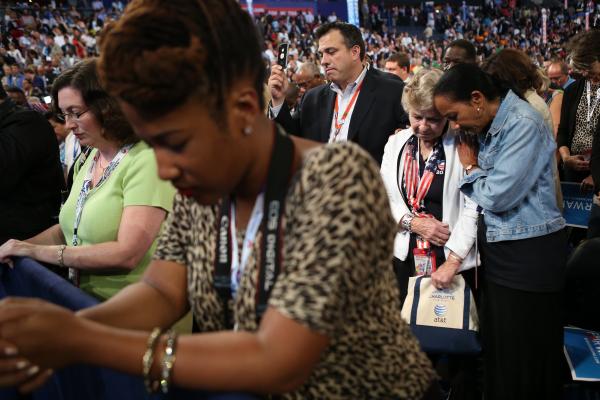The day after the election, Southern Baptist Seminary President Albert Mohler said, “I think this was an evangelical disaster.”
Not really. But it was a disaster for the religious right, which had again tied its faith to the partisan political agenda of the Republican Party — which did lose the election. But Nov. 6 was an even deeper disaster for the religious right’s leaders, because they will no longer be able to control or easily co-opt the meaning of the term “evangelical.”
During this election, much of the media continued to use the word as a political term — as a key constituency of the Republican conservative base. But what the media really means when they use term “evangelical” is “conservative white evangelical.” All other kinds of evangelicals are just never counted.
Just as the 2012 electoral results finally revealed the demographic transformation of America — which has been occurring for quite some time — it also dramatically demonstrated how the meaning of the word “evangelical” is being transformed.
Evangelical can no longer be accurately used to mean “white evangelical.”
Of the 71 percent (Pew, CNN) of America’s Hispanics who voted for President Barack Obama, the vast majority are either Catholic or Evangelical/Pentecostal. Obama lost the white Catholic vote, but he won “the Catholic vote” because of Hispanic Catholics. Similarly, Obama lost the white evangelical vote, but he won the majority of Hispanics who call themselves Evangelical or Pentecostal. Likewise, Obama won 93 percent of the African American vote, the majority of whom are members of black churches whose theology is quite evangelical. And 75 percent of the Asian American vote went for Obama, whose churchgoing members are also mostly evangelical.
Mitt Romney got about the same percentage of white voters that George Herbert Walker did (about 59 percent v. 60 percent for Bush), which resulted in 426 electoral votes for Bush, but only 206 for Romney.
So what does all that tell us? Very simply, the majority of the white evangelicals went for Gov. Mitt Romney, and the majority of the non-white evangelicals voted for President Barack Obama. Obama also won 60 percent of younger voters (ages 18-29) and that likely means younger white evangelicals voted for the president at a higher rate than their parents.
If demographics changed this election, they have also now changed the meaning of the term “evangelical.”
Religious right leaders like Ralph Reed, Franklin Graham, and Tony Perkins did everything they could to turn evangelicals to Romney, especially in the final run-up to the election. Their efforts to turn concerns about abortion and gay marriage into partisan arguments for a Republican victory — and to threaten dangerous consequences of a Democratic win — were, by their own estimates, the most extensive ever. But they failed and didn’t change the outcome of the election.
While most evangelicals are still “pro-life,” abortion is not their only concern. Not all are convinced that Republicans have the best answers to all the life issues. While most evangelicals are strongly committed to strengthening family life, not all think equal rights for gay and lesbian people are a threat to the family. Poverty reduction, immigration reform, a consistent life ethic, the creation care of environmental protection, a less militaristic foreign policy, and a deep commitment to racial and economic justice are all issues of concern.
The ironic and tragic thing about the religious right is how little of their own agenda they have achieved. And by voting for a conservative ideological agenda, they have actually hurt the poor, resisted immigration reform, promoted endless wars, and neglected the environment.
There is a new evangelical agenda for a new evangelical demographic.
It’s time to change the meaning of the word “evangelical.” It’s time to tell the media to look at the changing demographics, change its terminology, and take account of all the “evangelicals.” And it’s time to describe the broader list of “moral” and “biblical” issues that evangelicals care about. This is a new, diverse coalition for a new America — and a changing evangelical demographic is a central part of that. The narrow conservatism of the religious right’s white evangelicals is simply not a faith to and for that new evangelical world.
The biggest mistake the religious right made was to make the word “evangelical” a political term. Evangelical is a theological commitment, not a political one. It’s about the centrality of Christ and the authority of the Bible. It’s following Jesus and our obedience to the Scriptures that leads us to defend the poor, protect the most vulnerable, welcome the stranger, seek racial reconciliation and justice, be good stewards of the environment and peacemakers in a world of war.
Those commitments will always challenge politics, but they should never be partisan. Democrats should not make the same mistake that Republicans did in believing they have any permanent voting bloc. The policies and priorities of political parties and leaders should be and will be examined by the faith agenda of the new, diverse, and growing evangelical demographic — of the community we call the body of Christ.
This election signaled an important change in American public life and a transformation in the meaning of the word “evangelical.”
Got something to say about what you're reading? We value your feedback!
